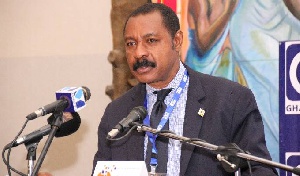 CEO of the Private Enterprise Foundation (PEF), Nana Osei Bonsu
CEO of the Private Enterprise Foundation (PEF), Nana Osei Bonsu
CEO of the Private Enterprise Foundation (PEF), Nana Osei Bonsu, has disagreed with an assertion by economist Prof Ernest Aryeetey that President Nana Akufo-Addo’s ‘1-district-1-factory’ industrialisation programme is not doable.
The immediate past Vice Chancellor of the University of Ghana said at a Graphic-Stanbic business breakfast meeting organised in Accra on Tuesday, 14 February that: “…I always say that since you are not going to create jobs in the short term in your cities, you’ve got to focus on rural districts. And how do you do it? It’s not going to be easy. I was very happy that in the government’s campaign to be elected, it did talk about one-district-one-factory [policy]. I don’t believe you can do that. I don’t believe you can do one-district-one-factory nor do I believe there is a need for it.”
According to Prof Aryeetey, “there is a need to have for each district of Ghana, an industrial development plan that will have a focus on transformation of the district economy and a focus on job creation, so, if that job creation, as a result of the plan, is coming through one factory, then so be it.”
As far as he is concerned, “…it is the structure of the district economy that will determine what should be done there: maybe that structure is going to lead to more emphasis on agriculture, maybe that structure is going to lead on construction, maybe that structure is going to lead on services, depending on the skills set available. So, we need to have for every district, a plan in terms of what is going to change and how that change is going to lead to more jobs.
“And I would say in that plan, the emphasis should be on modernising agriculture because that’s what you have, that’s the potential that you have most, the idea here is to help fill that middle that is missing,” Prof Aryeetey said.
Speaking at the same event, Nana Osei Bonsu reacted directly to Prof Aryeetey’s comment saying: “Prof, we think it’s tenable, we think it’s doable, we think it’s feasible, basically because the Private Enterprise Federation (PEF), looking at how the economy was not doing well, in 2016 started what we call District Business Coalitions where we are aggregating businesses within the rural areas in certain districts to come together and advocate with the duty-bearers, to get what they think they need in the communities. We didn’t want businesses coming from Accra to take opportunities in the districts and go back. …We have done Techiman, we have done Asante Mampong and we have done Ejura and these business coalitions are going to be the investors in the one-district-one-factory [programme].”
“We think that this one-district-one-factory opportunity is a way to develop the rural areas because the migration of our young people to the metropolitan areas has not been accompanied by jobs,” he argued.